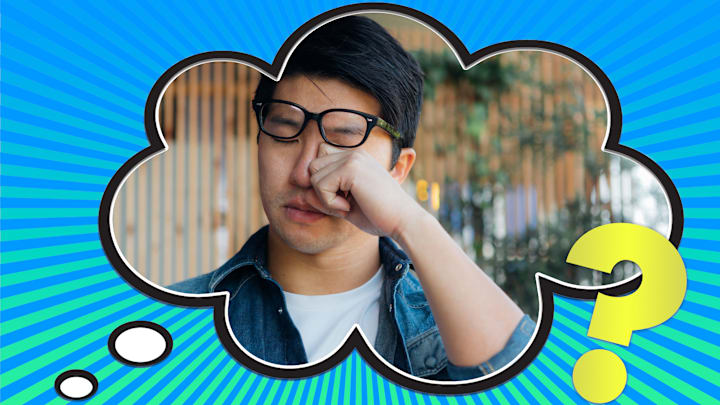It usually comes out of nowhere. You’re reading a book, or staring at the computer, or driving to work, when suddenly, your eyelid starts quivering uncontrollably. It’s an unwelcome (not to mention annoying) occurrence. And unfortunately, no one has a clear explanation for what causes these odd little tremors—but there are theories.
- What could be causing eye twitching?
- The Types of Eye Twitching
- How do I stop my eyelid from twitching?
What could be causing eye twitching?
Research has suggested that cutting back on afternoon lattes might help. Dr. Wayne Cornblath of the University of Michigan’s Kellogg Eye Center told TIME in 2015 that too much caffeine appears to be a possible cause of these tiny muscle spasms because it’s “a stimulant, and it increases reactivity within the muscles and nerves,” Cornblath said. Exactly how that happens is unclear, but it could be the reason why your eyelid goes haywire after you’ve enjoyed a venti Starbucks.
Stress may also be a contributing factor, since it ramps up production of epinephrine, a molecule connected with the fight-or-flight response that can cause muscle contractions or spasms. There’s also a correlation between eyelid-twitching and a lack of sleep, but researchers still haven’t figured out the specific underlying explanation.
Meanwhile, the Mayo Clinic offers a litany of other potential causes, which include:
- alcohol consumption
- smoking
- bright light
- physical exertion
- irritation of the eye surface or inner eye
- wind or pollution
It’s also possible that eye twitching is hereditary. According to Johns Hopkins Medicine, the condition “may run in families” and “can originate in the motor nerves of the brain.”
The Types of Eye Twitching
The Kellogg Eye Center divides the spasms people might experience in their lids into three categories. The most common eyelid twitch is “a unilateral slight spasm of your lower or upper eyelid, or occasionally both eyelids” that “usually resolves in a few days.”
Then there’s essential blepharospasm, which “starts as an increased blink rate and eventually leads to closing of the eyelids as well as squeezing of the muscles around the eyes” that “may cause a temporary inability to see.” The condition isn’t caused by stress or caffeine, but by the area of the brain that controls movement—and while it’s rare, it can be debilitating for those who experience it. According to The New York Times, severe, disruptive blepharospasm “can be treated with Botox, which is injected into the muscles of the eyelids to quell the spasms.”
Finally, there’s hemifacial spasm, which the Kellogg Eye Center characterizes as “a condition that involves involuntary closure of the eye along with muscles in the cheek, mouth, and neck, but on only one side of the face” that could be caused by “abnormality in the nerve to the facial muscles.” Botox can be used as a treatment here, too.
How do I stop my eyelid from twitching?
If you find that your eye is twitching, you can try cutting back on caffeine and alcohol, getting more sleep, and/or reducing stress by exercising. A warm compress or lubricating eye drops may also help, and if you find your eyes twitch more in bright light, throw on some sunglasses. While the first type of eyelid twitching is common, you should consult a doctor if spasms spread down your face and neck, if your whole eyelid starts involuntarily blinking, or if the twitch doesn’t go away for weeks. These may be symptoms of a more serious condition.
Discover the Answers to More Big Questions:
A version of this story ran in 2016; it has been updated for 2024.
